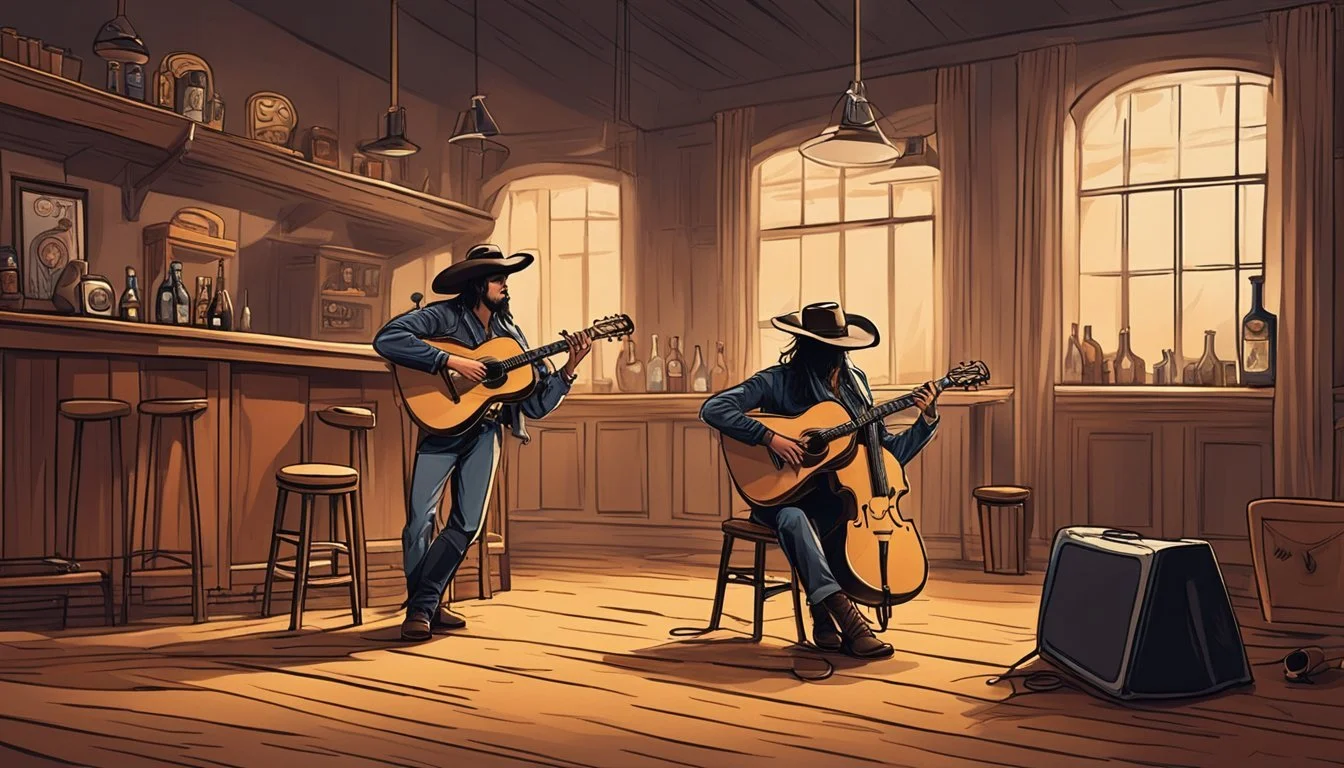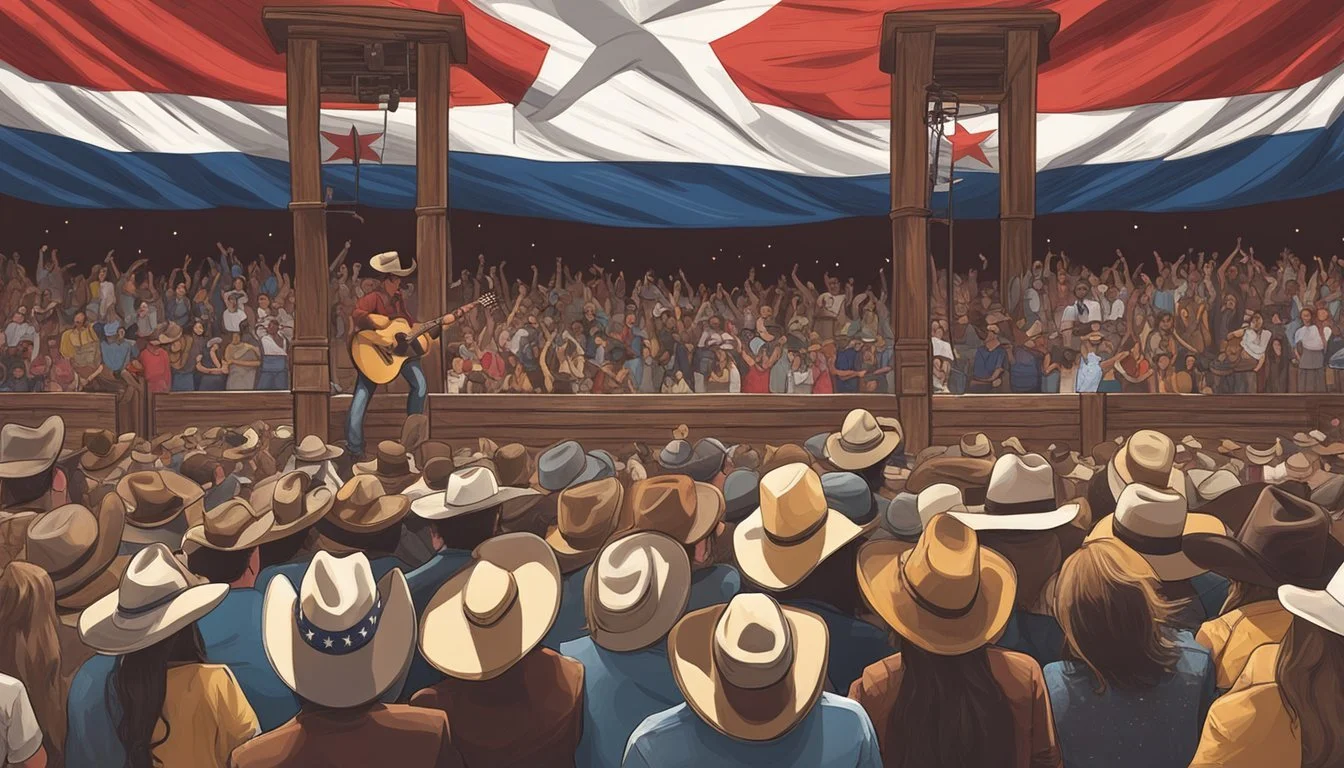7 Ways "Willie Nelson & Family" Captures the Essence of Outlaw Country
A Musical Legacy Defined
Willie Nelson's impact on country music extends far beyond his iconic songs and signature sound. The documentary series "Willie Nelson & Family" provides an in-depth look at the legendary musician's life and career, offering viewers a unique perspective on the outlaw country movement he helped pioneer.
The series captures the essence of outlaw country through its exploration of Nelson's artistic choices, personal experiences, and collaborations with other influential artists. By examining Nelson's journey, viewers gain insight into the rebellious spirit and authenticity that defined this groundbreaking subgenre of country music. The documentary serves as a testament to Nelson's enduring legacy and his role in shaping American musical culture.
1) "Whiskey River" by Willie Nelson
"Whiskey River" stands as one of Willie Nelson's signature songs. Originally written by Johnny Bush and Paul Stroud, Nelson made the track his own through countless live performances.
The song opens many of Nelson's concerts, serving as a familiar rallying cry for fans. Its lyrics paint a vivid picture of turning to alcohol to numb life's pain.
Nelson's rendition captures the raw emotion and world-weary spirit of outlaw country. His weathered vocals and acoustic guitar work perfectly embody the song's themes.
Live versions of "Whiskey River" often feature extended instrumental breaks. These showcase the impressive musicianship of Nelson's long-time backing band, Family.
The track has become closely associated with Nelson's image as a hard-living, free-spirited outlaw. It represents the blend of vulnerability and toughness that defines his persona.
"Whiskey River" remains a staple of Nelson's live shows decades after its release. Recent performances at events like Farm Aid and Outlaw Fest demonstrate its enduring popularity.
2) "On the Road Again" by Willie Nelson
"On the Road Again" stands as Willie Nelson's signature song and a quintessential outlaw country anthem. Released in 1980, the track captures the spirit of freedom and wanderlust that defines the genre.
Nelson wrote the song quickly while on an airplane, drawing inspiration from his life as a touring musician. The lyrics paint a vivid picture of life on tour, celebrating the joys of traveling and performing with friends.
The song's upbeat tempo and catchy melody contrast with the often melancholic themes found in country music. This optimistic outlook reflects the independent spirit of outlaw country artists.
"On the Road Again" achieved crossover success, reaching number one on the country charts and breaking into the top 20 on the Billboard Hot 100. Its popularity has endured for decades, becoming a staple of Nelson's live performances.
The track's enduring appeal lies in its universal theme of adventure and companionship. It resonates with listeners who yearn for the open road and the camaraderie of shared experiences.
3) "Pancho and Lefty" by Willie Nelson & Merle Haggard
"Pancho and Lefty" stands as a quintessential outlaw country collaboration between Willie Nelson and Merle Haggard. The song, originally written by Townes Van Zandt, gained widespread popularity through their 1983 duet version.
Nelson and Haggard's rendition showcases their distinctive vocal styles, blending seamlessly to tell the tale of two outlaws. Their interpretation brings depth and authenticity to the narrative, drawing from their own experiences and understanding of the outlaw lifestyle.
The track's success contributed significantly to the album of the same name, "Pancho & Lefty," which topped the Billboard country charts. It demonstrated the enduring appeal of outlaw country music and the power of storytelling within the genre.
Nelson and Haggard's collaboration on this song exemplifies the camaraderie often found in outlaw country. Their partnership highlights the genre's emphasis on authenticity and shared experiences among its artists.
The song's longevity and continued popularity attest to its impact on country music. It remains a staple in both Nelson's and Haggard's repertoires, cementing its place in the outlaw country canon.
4) "Blue Eyes Crying in the Rain" by Willie Nelson
"Blue Eyes Crying in the Rain" stands as one of Willie Nelson's most iconic songs. Originally written by Fred Rose, Nelson's rendition brought the track to widespread acclaim.
The song appeared on Nelson's 1975 album "Red Headed Stranger," which marked a turning point in his career. Its stripped-down arrangement showcased Nelson's distinctive vocals and guitar playing.
Nelson's interpretation of the song embodies the raw emotion and storytelling characteristic of outlaw country. The lyrics paint a poignant picture of lost love and longing.
The track's success helped solidify Nelson's status as a leading figure in the outlaw country movement. It reached number one on the Billboard Hot Country Singles chart in 1975.
"Blue Eyes Crying in the Rain" has become a staple of Nelson's live performances. Its enduring popularity speaks to its emotional resonance and Nelson's ability to connect with audiences through music.
5) "Mamas Don't Let Your Babies Grow Up to Be Cowboys" by Willie Nelson & Waylon Jennings
"Mamas Don't Let Your Babies Grow Up to Be Cowboys" stands as a quintessential outlaw country anthem. Written by Ed Bruce and Patsy Bruce, the song gained widespread recognition when Willie Nelson and Waylon Jennings released their duet version in 1978.
The track's lyrics paint a vivid picture of the cowboy lifestyle, highlighting both its allure and challenges. It speaks to the independent spirit and rugged individualism that define the outlaw country ethos.
Nelson and Jennings' vocal performances complement each other perfectly, with their distinctive voices blending to create a powerful, authentic sound. Their delivery captures the world-weary wisdom of seasoned cowboys, adding depth to the song's message.
The instrumentation features classic country elements like steel guitar and fiddle, anchored by a steady, driving rhythm. This musical backdrop reinforces the song's themes of freedom and restlessness.
"Mamas Don't Let Your Babies Grow Up to Be Cowboys" resonated deeply with audiences, topping the country charts and crossing over to mainstream success. Its enduring popularity demonstrates its status as a defining track in the outlaw country genre.
6) "Red Headed Stranger" by Willie Nelson
"Red Headed Stranger" stands as a landmark album in Willie Nelson's career and outlaw country music. Released in 1975, this concept album tells the story of a preacher on the run after killing his wife and her lover.
The sparse instrumentation and Nelson's emotive vocals create a haunting atmosphere that perfectly complements the narrative. The album's stripped-down production was unconventional for its time, showcasing Nelson's willingness to break from mainstream country norms.
Tracks like "Blue Eyes Crying in the Rain" became instant classics, demonstrating Nelson's ability to convey deep emotion through simple, heartfelt lyrics. The album's success helped solidify Nelson's status as a leading figure in the outlaw country movement.
"Red Headed Stranger" exemplifies the storytelling prowess and musical innovation that define outlaw country. Its raw, authentic sound and compelling narrative continue to resonate with listeners decades after its release, cementing its place as a pivotal work in Nelson's extensive discography.
7) "Me and Paul" by Willie Nelson
"Me and Paul" stands as a testament to Willie Nelson's enduring friendship with drummer Paul English. This autobiographical song captures the spirit of their adventures on the road together.
Released in 1971, the track became a staple of Nelson's live performances. It chronicles the duo's experiences touring across the United States, facing both triumphs and challenges along the way.
The lyrics paint vivid pictures of their travels, from run-ins with the law to late-night drives between gigs. Nelson's storytelling shines through, bringing listeners into the world of a touring musician.
Paul English, who passed away in 2020, was more than just Nelson's drummer. He served as his bodyguard, accountant, and confidant for over five decades. Their bond exemplifies the close-knit nature of outlaw country bands.
The song's honesty and vulnerability reflect key elements of the outlaw country movement. It eschews polished narratives in favor of raw, true-to-life experiences. This authenticity resonates with fans and fellow musicians alike.
The Legacy of Willie Nelson & Family
Willie Nelson's impact on country music extends far beyond his musical talents. His influence shaped the outlaw country movement and established a unique musical style that continues to resonate today.
Influence on the Outlaw Country Movement
Willie Nelson played a pivotal role in defining the outlaw country genre. His rebellious spirit and refusal to conform to Nashville's polished sound set him apart. Nelson's move to Austin in the early 1970s marked a turning point, as he embraced a more authentic and gritty musical approach.
His album "Red Headed Stranger" (1975) became a cornerstone of outlaw country. It challenged industry norms with its sparse production and narrative storytelling. Nelson's long hair, bandanas, and casual style also became iconic symbols of the movement.
His annual Fourth of July Picnic concerts, started in 1973, brought together like-minded artists and fans. These events helped solidify the outlaw country community and ethos.
Collaborations and Musical Style
Willie Nelson's collaborative spirit has been a hallmark of his career. He formed the supergroup The Highwaymen with Johnny Cash, Waylon Jennings, and Kris Kristofferson in 1985. This collaboration showcased the power of outlaw country's collective voice.
Nelson's distinctive guitar playing on his trusty guitar "Trigger" is instantly recognizable. His unique vocal phrasing, blending country, jazz, and pop influences, created a signature sound. This style is evident in hits like "On the Road Again" and "Always on My Mind."
His willingness to cross genre boundaries led to successful duets with artists from various backgrounds. Collaborations with Julio Iglesias, Snoop Dogg, and Norah Jones demonstrate his musical versatility and broad appeal.
Cultural Impact of Outlaw Country
Outlaw country reshaped American music and culture in the 1970s. It challenged industry norms and connected deeply with listeners through raw, honest songwriting.
Rebellion Against Nashville Sound
Outlaw country artists rejected the polished "Nashville Sound" that dominated country music. They favored a grittier, more authentic style. Willie Nelson, Waylon Jennings, and others grew long hair and beards, defying clean-cut country stereotypes. Their music incorporated rock and folk influences, expanding country's sonic palette.
This rebellion extended beyond music. Outlaw artists championed creative control over their work. They fought for the right to record with their own bands and produce their own albums. This stance inspired other musicians to demand artistic freedom.
Authenticity and Storytelling in Lyrics
Outlaw country lyrics focused on real-life experiences and struggles. Songs tackled topics like hard living, heartbreak, and social issues. Willie Nelson's "Red Headed Stranger" told a complex tale of love and murder. Kris Kristofferson's "Sunday Mornin' Comin' Down" vividly portrayed a hangover.
This lyrical approach resonated with audiences seeking honesty in music. Outlaw songs often felt like conversations with friends. They celebrated flawed characters and imperfect lives. This authenticity influenced future generations of songwriters across genres.
Outlaw country's impact reached beyond music. It shaped fashion trends, with denim, leather, and cowboy hats becoming symbols of rebellious cool. The movement's ethos of independence aligned with 1970s counterculture, bridging gaps between country fans and rock audiences.



